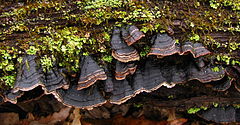Hymenochaete
Appearance
| Hymenochaete | |
|---|---|

| |
| Hymenochaete rubiginosa | |
| Scientific classification | |
| Kingdom: | |
| Division: | |
| Class: | |
| Order: | |
| Family: | |
| Genus: | Hymenochaete |
| Type species | |
| Hymenochaete rubiginosa (Dicks.) Lév. (1846)
| |
| Synonyms[6] | |
Hymenochaete is a genus of fungi in the family Hymenochaetaceae. The genus has a widespread distribution, especially in tropical regions.[7]
The name probably means long-haired membrane from the Greek hymen meaning membrane and chaite meaning long hair.
On the basis of sequence data, in 2002 the genus Pseudochaete was constructed for Hymenochaete tabacina, as it was found to be more closely related to the poroid Hymenochaetales Onnia and Porodaedalea.[8] Pseudochaete is however considered illegitimate since it is preoccupied by an algal genus.[9]
Species
[edit]- H. aberrans
- H. acanthophysata
- H. adusta
- H. agathicola
- H. allantospora
- H. americana
- H. anomala
- H. attenuata
- H. barbata
- H. berteroi
- H. biformisetosa – Yunnan Province, China[10]
- H. bispora
- H. boidinii
- H. boninensis
- H. borbonica
- H. borealis
- H. burdsallii
- H. cacao
- H. carpatica
- H. cervina
- H. cervinoidea
- H. cinnamomea
- H. coffeana
- H. colliculosa
- H. contiformis
- H. corrugata
- H. cruenta
- H. curtisii
- H. damicornis
- H. denticulata
- H. depallens
- H. dictator
- H. digitata
- H. dissimilis
- H. dura
- H. epichlora
- H. episphaeria
- H. escobarii
- H. fasciculata
- H. floridea
- H. fomitoporioides
- H. fuliginosa
- H. fulva
- H. fuscobadia
- H. gigaspora
- H. gillesii
- H. gladiola
- H. globispora
- H. harpago
- H. hauerslevii
- H. innexa
- H. intricata
- H. jobii
- H. konradii
- H. lenta
- H. leonina
- H. lictor
- H. lignosa
- H. livens
- H. longispora
- H. luteobadia
- H. macrospora
- H. magnahypha
- H. microcycla
- H. microspora
- H. minor
- H. minuscula
- H. mollis
- H. mougeotii
- H. murina
- H. muroiana
- H. nanospora
- H. nothofagicola
- H. noxia
- H. ochromarginata
- H. opaca
- H. palmicola
- H. papyracea
- H. parmastoi
- H. patelliformis
- H. paucisetosa
- H. pellicula
- H. pertenuis
- H. pinnatifida
- H. plurimaesetae
- H. pratensis
- H. proxima
- H. pseudoadusta
- H. reniformis
- H. reticulata
- H. rhabarbarina
- H. rheicolor
- H. rigidula
- H. rubiginosa
- H. rufomarginata
- H. ryvardenii
- H. semistupposa
- H. senatoumbrina
- H. separabilis
- H. separata
- H. sordida
- H. spathulata
- H. sphaerospora
- H. spinulosetosa
- H. spreta
- H. stratura
- H. subferruginea
- H. subpurpurascens
- H. tasmanica
- H. tenuis
- H. tomentelloidea
- H. ungulata
- H. unicolor
- H. ustulata
- H. vagans
- H. vaginata
- H. vallata
- H. variegata
- H. villosa
- H. yasudae
References
[edit]- ^ Léveillé JH. (1846). "Descriptions des champignons de l'herbier du Muséum de Paris". Annales des Sciences Naturelles Botanique (in French). 5 (3): 111–167 (see page 150).
- ^ Karsten PA. (1889). "Kritisk öfversigt af Finlands Basidsvampar (Basidiomycetes; Gastero- & Hymenomycetes)". Bidrag till Kännedom av Finlands Natur och Folk (in Finnish). 48: 428.
- ^ Murrill WA. (1904). "The Polyporaceae of North America: VIII. Hapalopilus, Pycnoporus and new monotypic genera". Bulletin of the Torrey Botanical Club. 31 (8): 415–28. doi:10.2307/2478892. JSTOR 2478892.
- ^ Murrill WA. (1907). "Some Philippine Polyporaceae". Bulletin of the Torrey Botanical Club. 34 (9): 465–81. doi:10.2307/2479067. JSTOR 2479067.
- ^ Ryvarden L. (1985). "Stipitochaete, gen. nov. (Hymenochaetaceae)". Transactions of the British Mycological Society. 85 (3): 535–539. doi:10.1016/s0007-1536(85)80056-5.
- ^ "Synonymy: Hymenochaete Lév". Species Fungorum. CAB International. Retrieved 2014-09-19.
- ^ Kirk PM, Cannon PF, Minter DW, Stalpers JA (2008). Dictionary of the Fungi (10th ed.). Wallingford, UK: CAB International. p. 327. ISBN 978-0-85199-826-8.
- ^ Wagner T, Fischer M (2002). "Classification and phylogenetic relationships of Hymenochaete and allied genera of the Hymenochaetales, inferred from rDNA sequence data and nuclear behaviour of vegetative mycelium". Mycological Progress. 1 (1): 93–104. Bibcode:2002MycPr...1...93W. doi:10.1007/s11557-006-0008-9. S2CID 44799279.
- ^ "Pseudochaete T. Wagner & M. Fisch. 2002". MycoBank. International Mycological Association. Retrieved 2012-07-08.
- ^ Yang J, He S-H (2014). "Hymenochaete in China. 8. H. biformisetosa sp. nov. with a key to species with denticulate setae". Mycotaxon. 128: 137–144. doi:10.5248/128.137.
